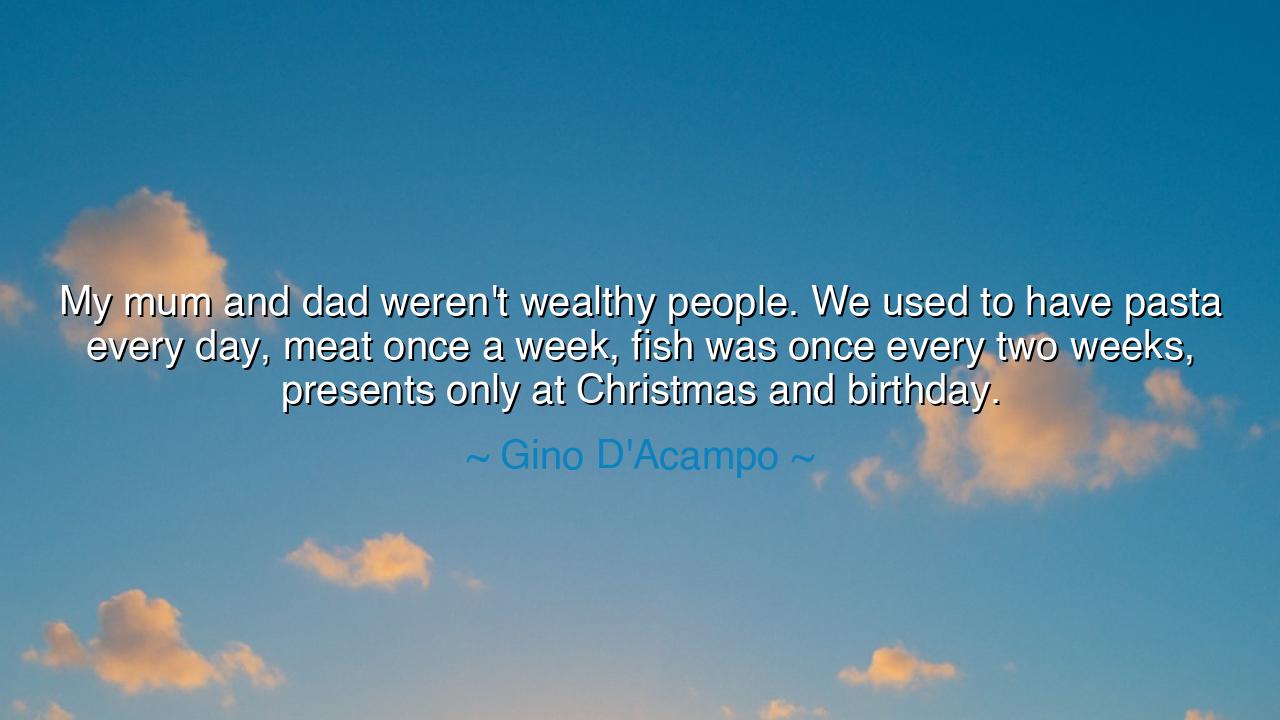
My mum and dad weren't wealthy people. We used to have pasta
My mum and dad weren't wealthy people. We used to have pasta every day, meat once a week, fish was once every two weeks, presents only at Christmas and birthday.






Host: The room feels nostalgic, as if the conversation is about to touch on memories of simpler times, family values, and the way our backgrounds shape who we become. The soft evening light creates a warm atmosphere, while outside, the world continues at its usual pace. Inside, however, the air feels like it’s preparing to explore the essence of growing up with modest means and the lessons that come with it. Jeeny sits at the table, her fingers lightly tracing the rim of her cup, her expression thoughtful. Jack stands near the window, arms crossed, gazing out at the street below.
Jeeny: (her voice gentle, yet filled with curiosity) “You ever think about how our childhoods shape the way we view things like money, family, and success? How growing up with less can sometimes give us a stronger appreciation for the simple things in life?”
Jack: (glancing over at her, his voice dry, but intrigued) “Growing up with less, huh? Yeah, it’s funny how some of us who didn’t have everything seem to value the little things more. It’s almost like not having everything handed to you teaches you more about what’s important. What made you think about it?”
Jeeny: (nodding slowly, a small smile forming as she shares her thought) “I was thinking about something Gino D’Acampo said: ‘My mum and dad weren't wealthy people. We used to have pasta every day, meat once a week, fish was once every two weeks, presents only at Christmas and birthday.’ It made me reflect on how the way we grow up with limited resources doesn’t diminish our happiness—it teaches us to appreciate what we have.”
Jack: (pauses, considering her words carefully) “So, he’s saying that even though they didn’t have a lot of money or fancy things, they still found joy in the simple, everyday things? That it wasn’t about what they didn’t have, but about valuing what they did?”
Jeeny: (smiling more deeply now, her eyes steady as she explains further) “Exactly. D’Acampo’s point is that growing up without abundance doesn’t mean you’re lacking. It teaches you to appreciate the small things—food, family, simple pleasures. They may not have had a lot, but they still made the most of what they had, and in that, they found richness.”
Host: Jeeny’s words seem to settle in the room, creating a subtle shift in the conversation about values, family, and the simple things that shape us. Jack stands still, his expression softening as he processes the deeper message behind D’Acampo’s statement. The world outside continues its rhythm, but inside, the conversation feels rooted in a more profound understanding of the value of modesty and appreciation.
Jack: (his voice quieter now, almost reflective) “I see what he means. Growing up with less isn’t about what you miss out on—it’s about learning to value what’s right in front of you. Sometimes, having less teaches you more about life than having everything handed to you.”
Jeeny: (nodding slowly, her voice calm, yet filled with quiet strength) “Exactly. The simplicity of it all—the pasta every day, the gifts on special occasions, the family time—those are the things that matter most. It’s not about how much you have; it’s about what you make of what you’ve got.”
Jack: (pauses, a small smile forming on his face as the idea sinks in) “It’s liberating, isn’t it? To realize that abundance doesn’t always equate to happiness. Sometimes, it’s the simple things, the small moments, that bring the most joy.”
Jeeny: (smiling warmly, her voice gentle, yet filled with wisdom) “Exactly. The best things in life don’t come from wealth or possessions—they come from relationships, appreciation, and the richness of simple experiences. When we focus on what we have, instead of what we don’t, we realize just how much we truly have.”
Host: The room feels lighter now, as though the conversation has shifted into a deeper understanding of value, simplicity, and appreciation. Jack turns from the window, his posture more relaxed, his thoughts clearly reflecting on the importance of finding joy in the small things. Jeeny watches him, content in the realization that true richness comes not from material things, but from the simple, meaningful moments we cherish. The world outside continues its rhythm, but inside, there’s a shared understanding that happiness isn’t about abundance—it’s about appreciating what we already have.






AAdministratorAdministrator
Welcome, honored guests. Please leave a comment, we will respond soon